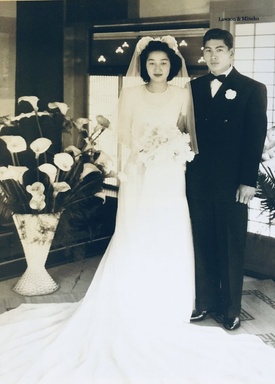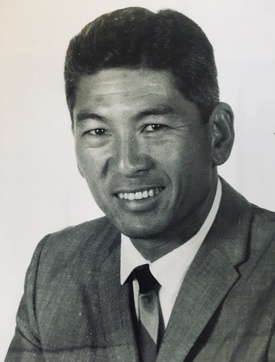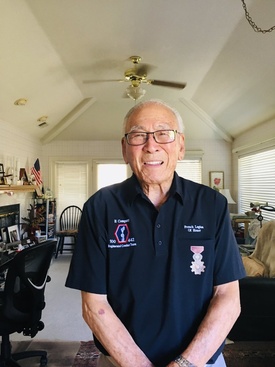You were a part of these major battles that were significant. And I think a lot of people today see those battles as suicide missions that the 442 was sent into. Do you ever look back and just wonder how you survived this?
You wonder how you survived. One of my good friends from Hawai’i, from Hilo, his name was Sunei Sakamoto. He was the platoon sergeant for the 3rd platoon of E Company. He was vicious. A real nice guy. But, in battle he was loud, standing up there, hollering everybody to charge and he’d get everybody in 3rd platoon charging. He finally was injured pretty badly. But I don’t know how he survived either. You know, he was a leader. I never saw anybody going to battle like he did. Just amazing. But that’s what it took. And that’s what the 442nd did. I think what probably no other American infantry unit did. The Germans said, “We don’t want to fight those guys. They fight like maniacs.”
And then do you think that was because of what you said, it was camaraderie but also being culturally Japanese?
I think the culture, yeah. You know the background. Two things: You’re Japanese, you became the enemy, now you have to prove you are not the enemy, and of course your background is, “We’re gonna fight till the death.” You know, we are not just doing lip service, we’re out there to win the war. No matter what. And if we die, we die. That was it. That’s how the 442 fought.
Amazing. How was the reunion with your parents, after you came back?
Well I’d been gone for a long time. You know, my parents never asked me what happened, I don’t think they knew or maybe that was the Issei culture, you don’t ask.
They never knew about any part of the service?
No they never, you know, we never corresponded during the war. I wrote to my sister a few times. I wrote to my girlfriend a few times. But you know, I wasn’t much into correspondence because, number one, you’re hardly ever at a place where you have paper or a pen. And the number two, you have to carry everything. Your personal belongings. So if you needed a pen, you had to carry it in your pack or something. So we didn’t want to carry anything we didn’t need.
You were a little too busy for that!
Yeah, really! [laughs]
So, were your parents relieved to see you? Do you think that was a–
You know, in our Issei, Nisei culture that was like: “I’m home!” “Oh.” You know. And they speak Japanese and I don’t speak Japanese. [laughs]
Yeah.
No hugging. No kissing. No grabbing hands. It’s just bowing. And that’s it.
Now, Mineko later became your wife. Did being in the war make you marry her? What was the story behind it?
Well, I think I was shell-shocked. That’s probably why I wanted to get married [laughs].
Shell-shocked, yeah.
But you know, the war is over they were trying to send me to Rome for further training and I told Captain Burns, our company commander, “I am not going any place in the army. I just want to get out. I just want to – the War is over, I am still alive – I just want to go home. Get me out of here somehow.” And it took May ‘til November, so it took six months to get me out. There was a point system. And the boys from Hawaii had five points for going from Hawaii to the mainland. Because that was overseas for them. So they got five points more than me. So, most of the Hawaii boys got to go home before me.
Wow.
So I had to kill time there in northern Italy until they called us. So I came home in late November 1945. But the 442nd itself didn’t come home until July of the following year. So all these young boys are now being drafted and trained in Camp Shelby. They’re being sent over as replacement. So, all these young Nisei boys are in the 442 but the war is over. So, you know, a lot of them didn’t see any action. But they’re veterans of the 442. Some of them went to the Pacific. You know, because they transferred. But for us, the war was over.
When you reflect back on your life and your service, what do you think is one of the most important or crucial lessons that we can learn from World War II and what is the thing that you want people to remember about that time today?
I think the biggest thing that’s happened is communication. In 1941, we only had radio and newspapers. And that’s all you heard or saw and now, instantly, you can put something in your phone and send it around the world. In seconds, you can correspond with anybody, with any subject.
When World War II ended, the United States was in a poor financial condition. The war had drained the country of almost everything. The young men that were coming back from war, all they wanted to do was get on with life. It was get married, get a house, have kids, get a job. Just go on with life. And I think for a lot of us, we all had PTSD pretty badly. Those in the infantry. Those who actually had to do the fighting on the front line. And the military had no cure for that, no treatment. It was, “Oh you just have battle fatigue, you’ll get over it.” But for all of us it was mainly, those who could stand alcohol, it was drink alcohol. And drink and drink until you passed out. And when you passed out, you forgot everything. Until you woke up then it started all over again. A lot of Nisei boys became alcoholics. I drank a lot, but I think I was able to control it. I passed out a few times you know, it was the only cure that we had for PTSD. I still have it! And it will never go away. It’s in there someplace.
Yeah. I can’t imagine.
Yeah. So for most of us, we need to get on with our life. The war is over, that’s dead and gone. What’s next? You know, the Nisei population basically had to come out of prison on the mainland. Get out of prison, 25 dollars and a ticket to wherever you wanted to go. And start all over. Not only were the soldiers coming home with nothing to start over. But their parents and siblings, all had nothing to start over. That’s another big story in this area, how so many got started again.
What is the lesson that you want your grandchildren to remember about your experience?
Well in 1941, we did what we had to do. A big rumor was, “Now that we have most of the Japanese in these camps, we just load them on the ships and send them all to Japan.” Well, they could have done that, there would have been no Japanese left on the soil of the United States. That was the intention of the racist people that were running the country. We overcame that. But we had to go to war to do that. And if the Nisei boys had not volunteered, there would be no Japanese living in the United States today.
You think?
You wouldn’t be here. No Canon cameras, no Toyotas, no sushi bars. Nothing Japanese would have been in the United States. It’s what the Nisei boys did in 1941 and ’42 that saved the Japanese population from annihilation in this country. And that’s what the Sansei, Yonsei, Gosei kids, have to remember what happened way, way back, that their parents probably don’t even remember.
That’s why your story is a powerful one to tell.
Well, I’m not sure if it means anything but, times are different now. In those days it was do or die. Today, I don’t know.
Yes. And war was very different too.
I am a firm believer that the government has to be changed. We have to have very strict gun control and mainly weapons that are used in warfare should never be allowed in the public area. No one should have a gun that shoots automatic. No hunter should use a gun like that. It’s bad enough to shoot human beings with a gun like that. But it’s a weapon designed for war. And it shouldn’t be available to anybody. Unless you’re in the military. And until people in this country have the courage to stop the NRA or the government leaders who allow this to go on — they should’ve been stopped a year ago. Or two years ago. Keeps on going. Just that weakness is a sign of the end of the U.S. as it is.
Do you think we just sort of lost that morality?
It’s very difficult. You know the country is so divided. I think eventually it’s either gonna be make or break. This country is going to have to correct itself, or it’s going to fall apart. And I don’t know if another country will try to take over, or if it’s going to be an internal revolution. It just can’t go on the way it is.
Something’s got to give.
Yeah. Well, you know, there is a new generation every twenty years. Perhaps I should add that the Nisei generation probably saved the Japanese population from extinction in the United States. I think the young people that have Japanese blood who are descendants of the Nisei need to remember how they got here. And if their parents haven’t told them, then maybe this is the way that they’ll find out. And hopefully, maybe it will increase the knowledge and perhaps help that next generation become leaders of this country, knowing what their ancestors had to go through. A very important thing.
A special thank you to Kathe Hashimoto for helping to record this interview.
Transcription by Eliane Schmid.
*This article was originally published on Tessaku on April 23, 2019.
© 2019 Emiko Tsuchida








